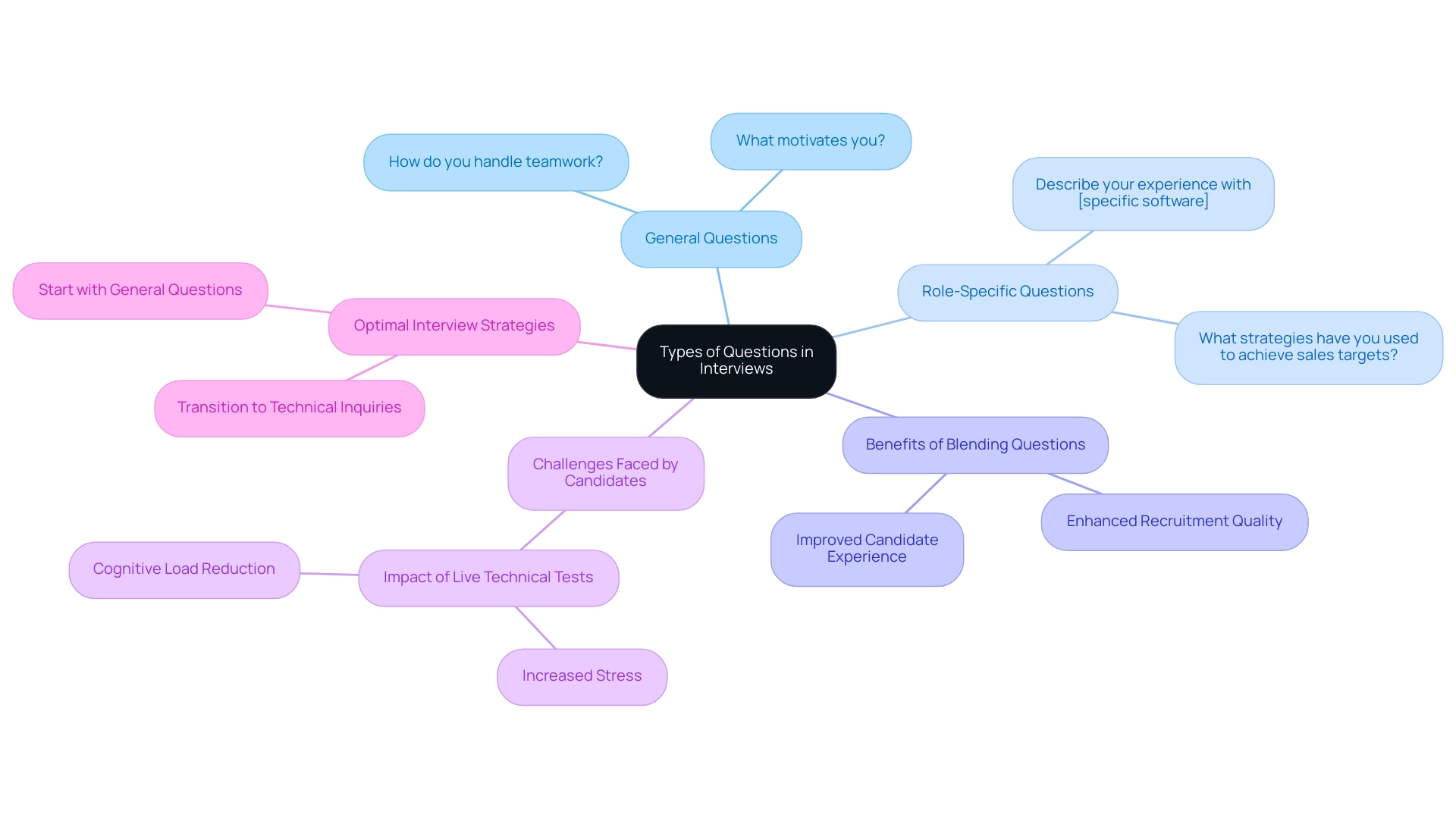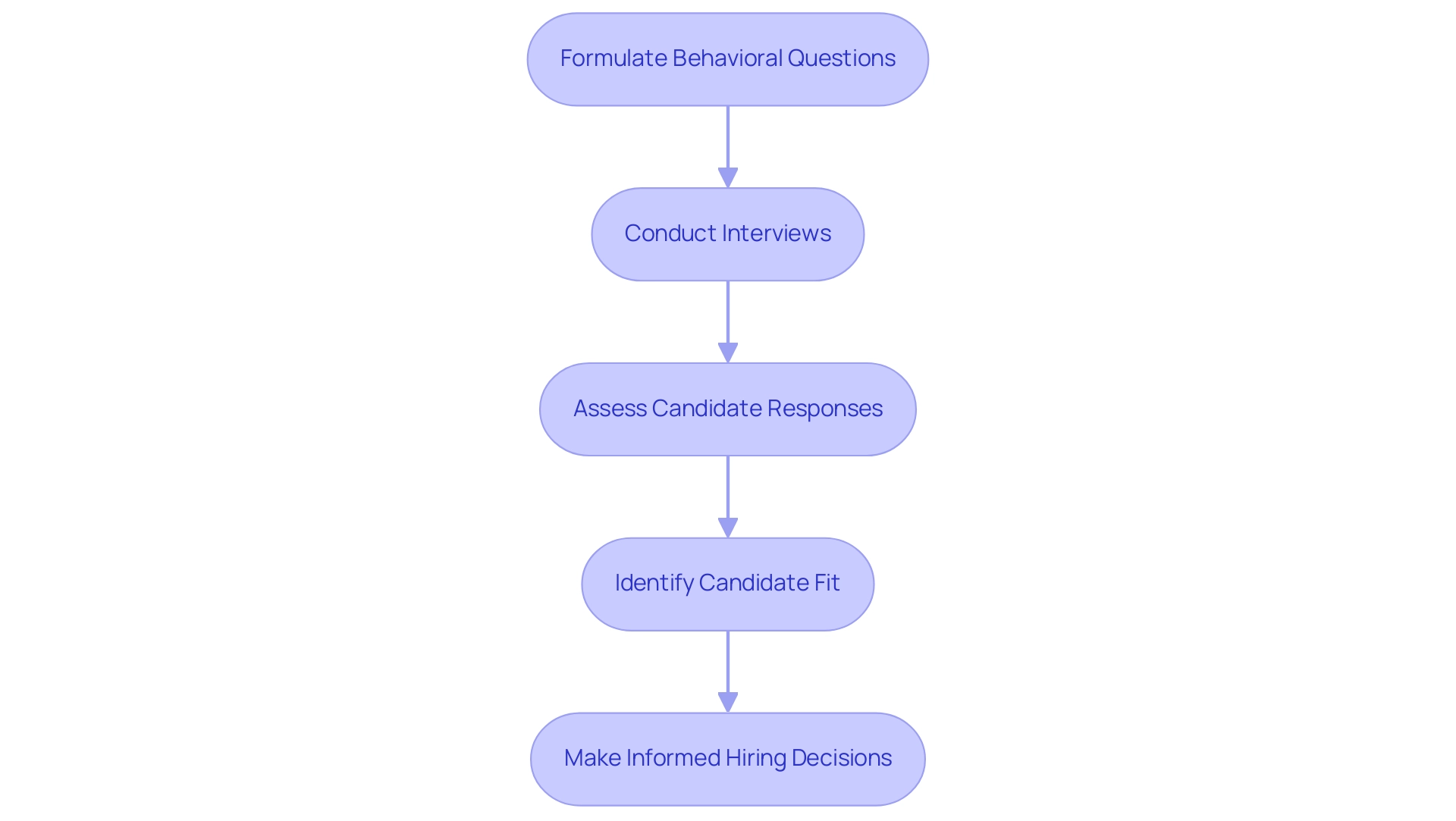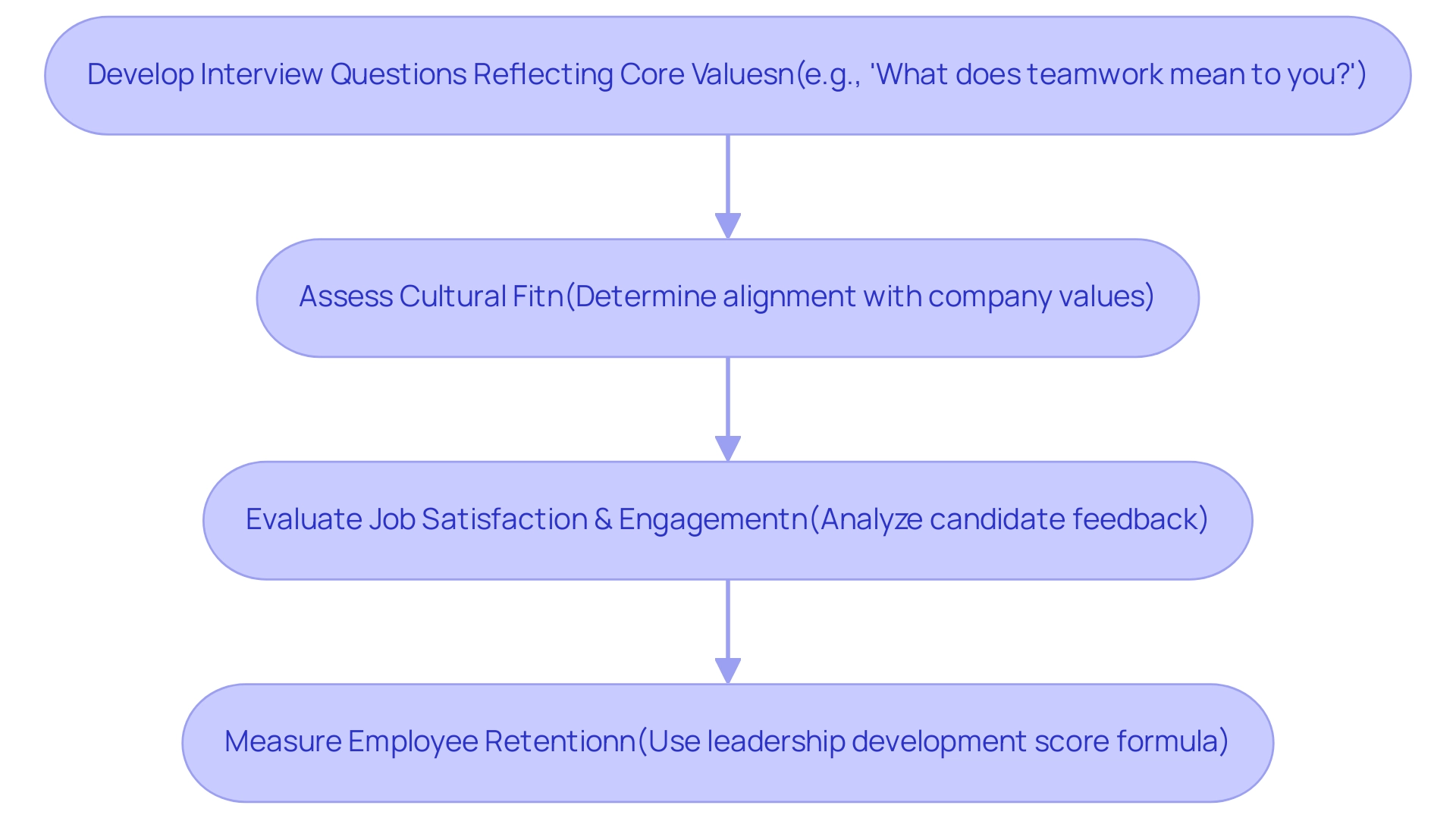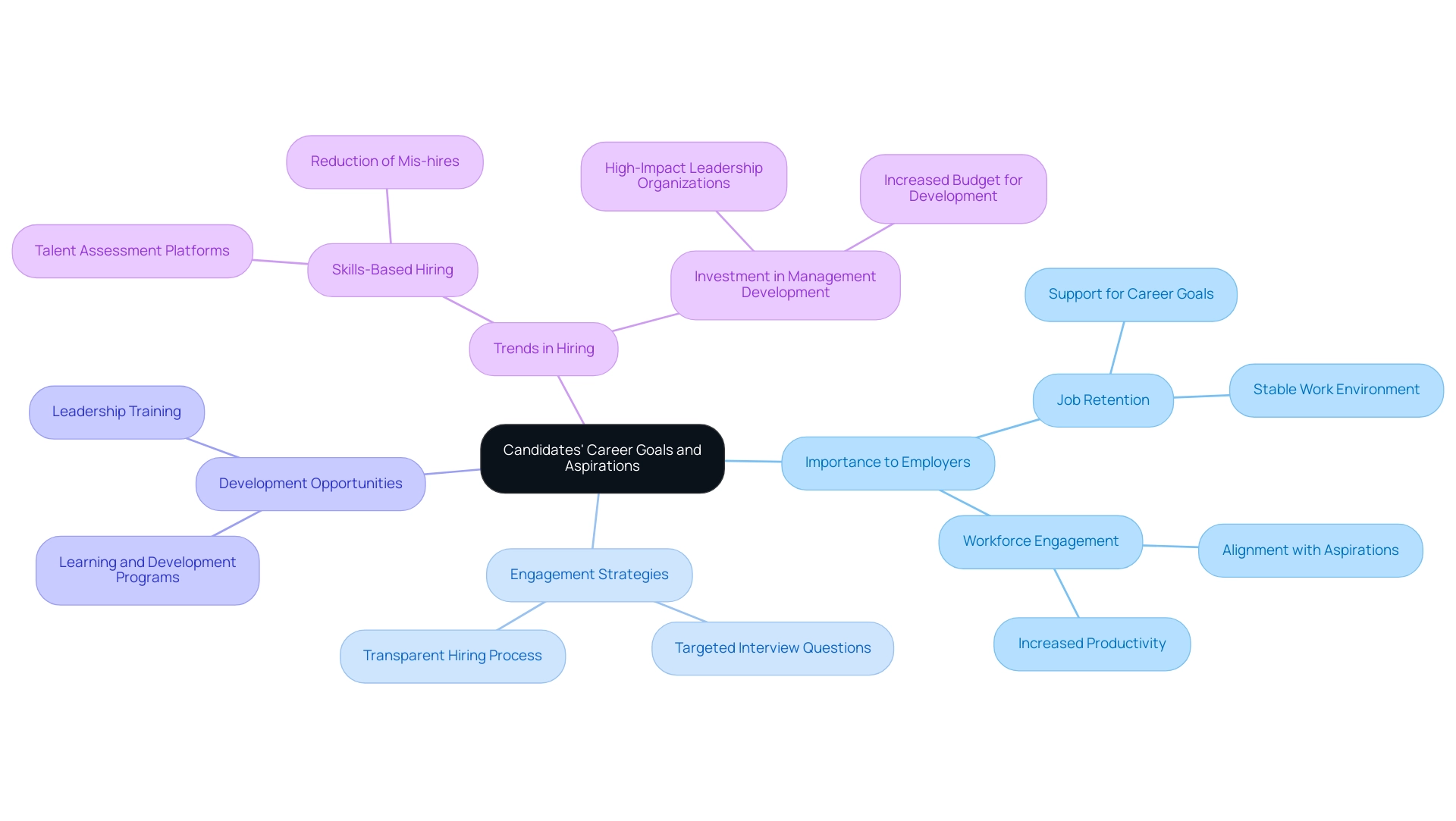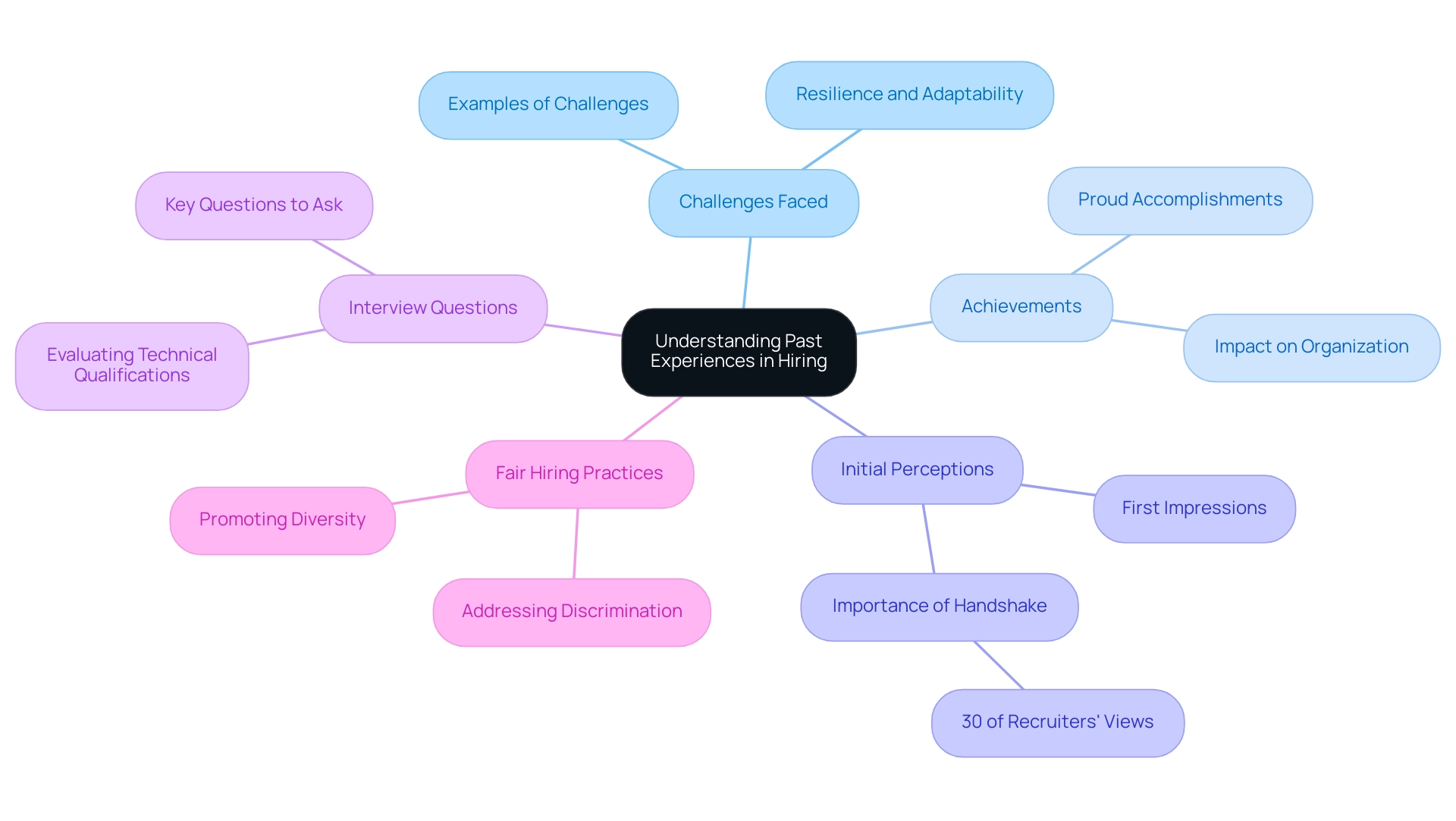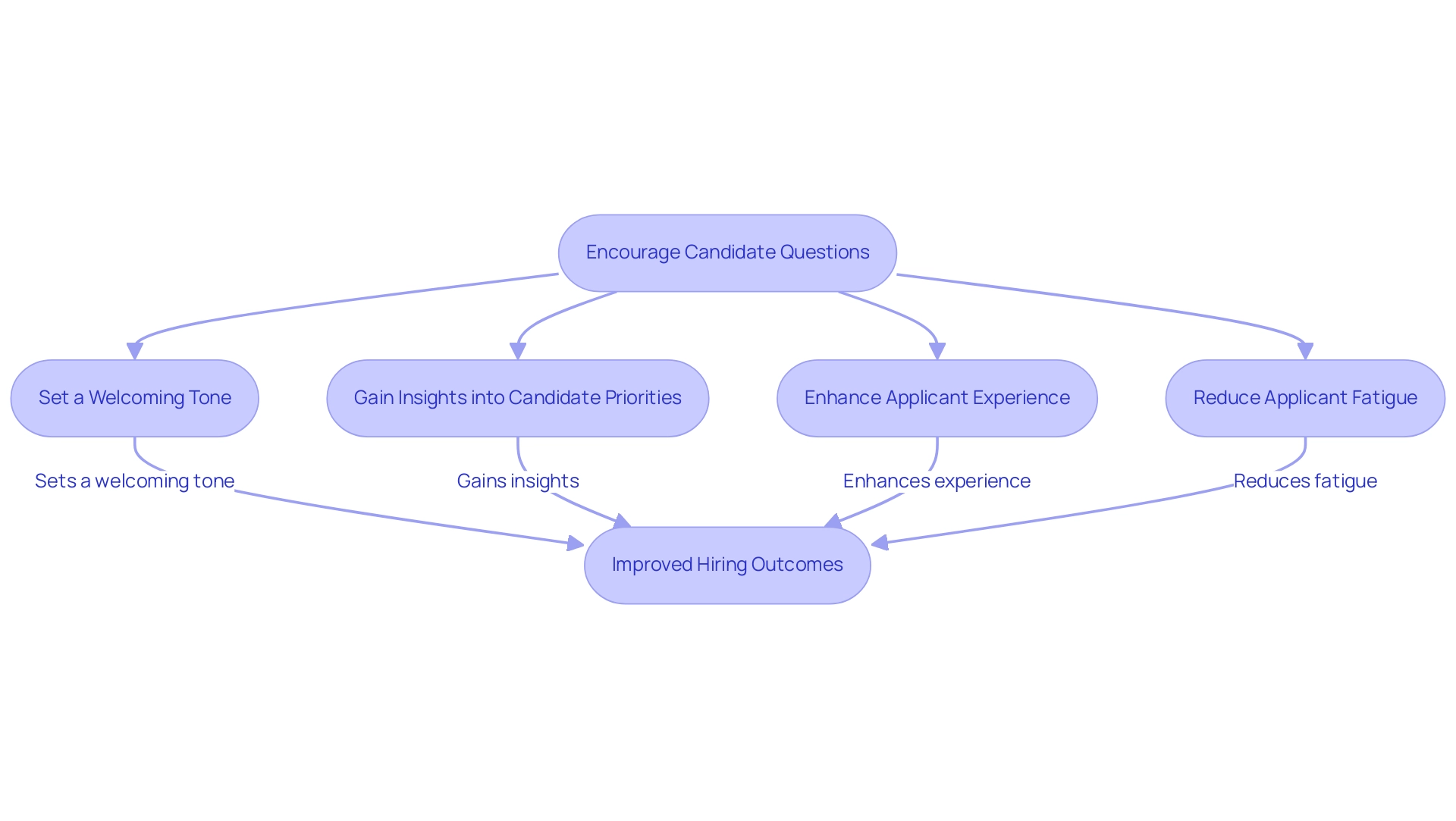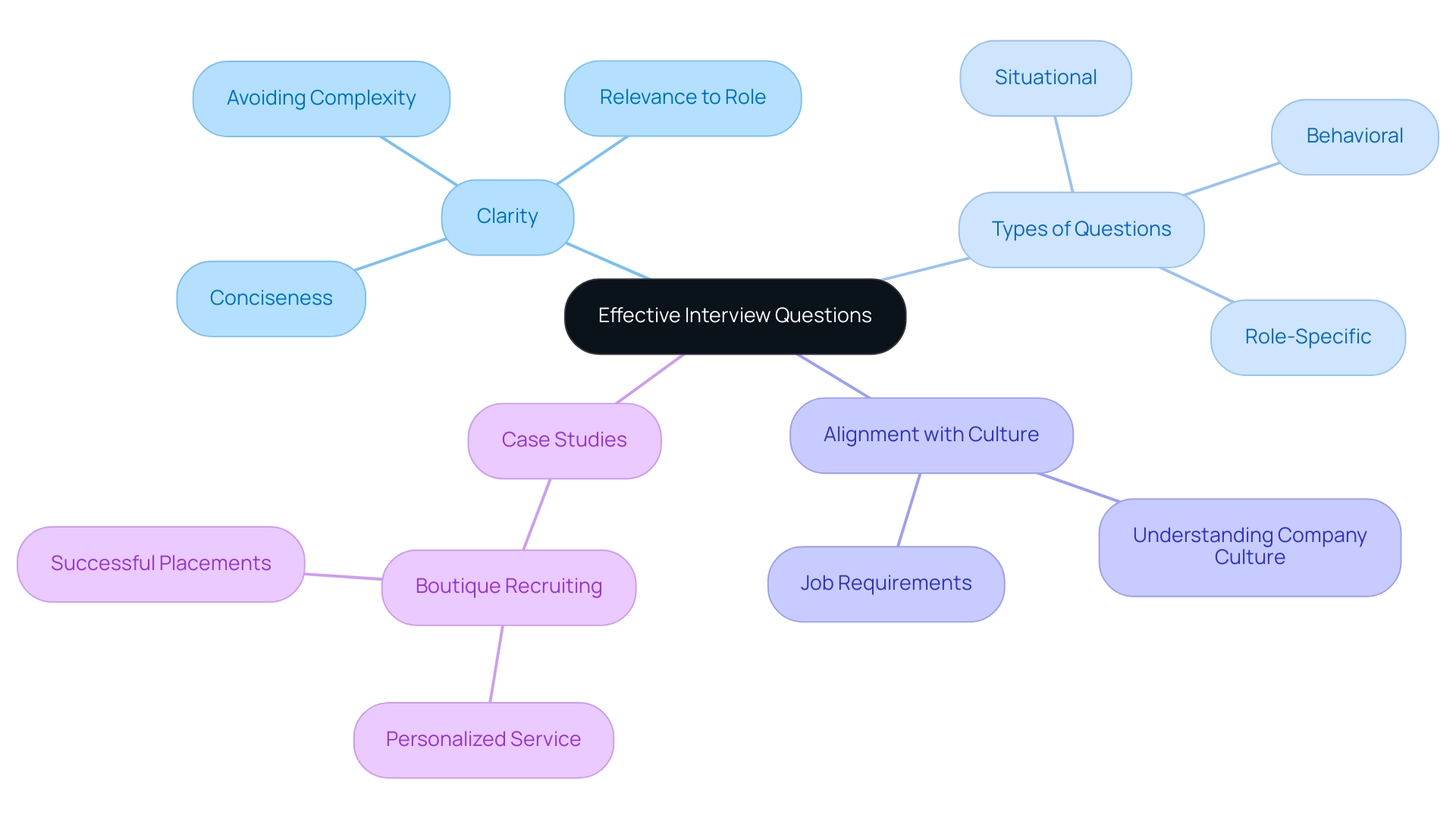Overview
Best practices for employer questions in interviews underscore the necessity of formulating clear, relevant, and diverse inquiries that evaluate candidates’ skills, cultural fit, and long-term aspirations. This approach is particularly vital in the recruitment landscape, where behavioral and situational questions emerge as powerful tools in predicting job performance and minimizing turnover. By integrating these strategies, organizations can significantly enhance the overall hiring process and improve the candidate experience.
How effectively are you leveraging these insights in your interviews?
Key Highlights:
- Asking the right questions in interviews is crucial for assessing candidates’ skills and fit within the organization.
- Behavioral and background questions correlate more closely with turnover rates than situational or job knowledge assessments.
- Employers should create questions that encourage applicants to share experiences and reasoning, fostering insightful dialogue.
- Diversity and inclusion in hiring processes can attract top talent and foster innovation.
- A dual approach of general and role-specific inquiries is recommended for effective candidate evaluation.
- Behavioral questions help assess critical competencies like problem-solving and resilience.
- Situational questions provide insights into candidates’ decision-making methodologies and values.
- Aligning questions with company culture enhances employee retention and job satisfaction.
- Understanding candidates’ career goals can help employers tailor development opportunities and improve engagement.
- Encouraging candidates to ask questions fosters open dialogue and enhances the overall interview experience.
- Employers should prioritize clarity and relevance in crafting interview questions to improve hiring outcomes.
Introduction
In the competitive landscape of talent acquisition, the ability to ask the right questions during interviews is paramount. Employers must transcend the basics, delving into inquiries that reveal not only a candidate’s qualifications but also their problem-solving skills, cultural fit, and long-term aspirations. Research indicates that behavioral and background questions significantly correlate with employee retention; thus, the importance of strategic questioning cannot be overstated.
As organizations strive to attract top talent, particularly in high-demand fields like finance and technology, crafting insightful and targeted interview questions becomes a crucial element in fostering a successful hiring process. By aligning questions with company culture and values, employers can enhance their recruitment strategies and ultimately build a more engaged and stable workforce.
The Significance of Asking the Right Questions in Interviews
Inquiring about the appropriate employer questions to ask in an interview is essential for revealing the genuine abilities of applicants, particularly in today’s competitive talent environment. These questions can effectively illuminate not only an applicant’s qualifications but also their problem-solving skills, cultural fit, and long-term goals. Research shows that previous behavioral and background inquiries are more closely associated with turnover rates than situational or job knowledge assessments, emphasizing the significance of focused interrogation in the selection method.
Employers at Boutique Recruiting should focus on creating employer questions that motivate applicants to share their experiences and reasoning. This approach promotes a more insightful dialogue, enabling interviewers to assess not only technical skills but also how the individual aligns with the company’s culture and values—essential employer questions to ask in an interview. Organizations that emphasize diversity and inclusion in their hiring processes have been shown to attract top talent and foster innovation.
The case study titled “Promoting Diversity and Inclusion in Interviews” illustrates how effective questioning can enhance diversity by ensuring all candidates have equal opportunities to showcase their skills.
In 2025, the significance of posing the appropriate inquiries cannot be overstated. As Rohit Ram Gopal aptly observes, “It is essential to have a clear understanding of the required competencies for the role and develop employer questions to ask in an interview that directly address those skills.” This viewpoint strengthens the notion that these questions are not simply a formality but a strategic instrument that can greatly impact hiring results, especially in high-demand finance and technology positions such as CFO, Financial Manager, and Director of Finance.
Moreover, statistics reveal that overall assessment scores have a minimal correlation with turnover, with a correlation value of 0.08 and a p-value of 0.19. This indicates that the quality of inquiries made may have a more crucial influence in applicant selection than was once believed. By concentrating on effective employer questions to ask in an interview, employers at Boutique Recruiting can better uncover candidate potential, ensuring that they select individuals who not only meet the technical criteria but also thrive within the organizational culture.
Furthermore, comprehending company culture and particular job requirements can guide the creation of these effective inquiries, further improving the selection process and assisting in navigating the ongoing battle for talent.
Types of Questions to Consider: General vs. Role-Specific
To conduct effective interviews, employers must strategically blend general and role-specific inquiries, particularly in high-demand finance and technology positions such as CFOs, Financial Managers, and Chief Technology Officers. General inquiries, such as ‘What motivates you?’ and ‘How do you handle teamwork?’ are essential for evaluating an applicant’s compatibility with the company culture and values. These inquiries assist in uncovering the applicant’s interpersonal abilities and flexibility, which are vital in contemporary collaborative work settings, especially as leading applicants become more discerning regarding their job prospects.
Conversely, role-specific questions, such as ‘Can you describe your experience with [specific software]?’ or ‘What strategies have you used to achieve sales targets?’ enable employers to assess the applicant’s technical expertise and practical knowledge relevant to the position.
This focused questioning is particularly significant considering that 60% of recruiters now employ video technology for assessments. While this can enhance efficiency, it also necessitates that individuals showcase their abilities effectively under stress.
As Eric Eddy from CPA Resources Global Professionals highlights, “the firm’s capacity to provide high-quality individuals promptly and effectively” underscores the importance of efficient selection strategies in recognizing the right talent. Boutique Recruiting emphasizes the necessity for customized recruitment solutions that address the distinct requirements of each position, ensuring that hiring managers are prepared to manage the selection stage effortlessly.
Employers are encouraged to adopt a dual approach by considering employer questions to ask in an interview, ensuring a comprehensive evaluation of each applicant’s qualifications and suitability for the organization. For instance, a case study highlighting the preference for cross-functional skills illustrates that organizations prioritizing such competencies tend to build stronger teams and enhance overall performance. This increasing demand for cross-functional skills should be evident in the selection process, as individuals who possess these abilities can contribute more effectively to diverse business operations.
Moreover, it is essential to consider the challenges individuals face during assessments, such as the impact of live technical tests, which can increase stress and cognitive load, potentially reducing performance by 50%. By combining general inquiries that assess soft skills with specific prompts that evaluate technical abilities, employers can create a more effective selection strategy by utilizing employer questions to ask in an interview, attracting top talent and enhancing the overall applicant experience.
Optimal methods indicate that combining these varieties of inquiries not only boosts the quality of the recruitment process but also enriches the applicant experience. For example, a successful discussion strategy might involve starting with general questions to establish rapport before transitioning to more technical inquiries. This method not only eases individuals into the interview but also allows employers to gauge their comfort level and communication skills, ultimately leading to more informed hiring decisions.
In this competitive job market, where applicants are assessing employers just as much as they are being assessed, implementing these strategies is crucial for attracting and retaining top talent.
Leveraging Behavioral Questions to Assess Candidate Fit
Behavioral questions, such as ‘Tell me about a time when you faced a significant challenge at work,’ serve as invaluable tools for evaluating applicants’ past behaviors and decision-making processes. These inquiries encourage individuals to share specific examples from their experiences, enabling employers to assess critical competencies such as problem-solving skills, resilience, and the ability to perform under pressure. In today’s competitive job market, where the very best applicants are selective about their opportunities, it is crucial for hiring managers to conduct interviews that not only assess skills but also align with the applicants’ expectations of a supportive and engaging workplace.
Research indicates that 25% of large organizations employ assessment centers that simulate real work scenarios, highlighting the growing recognition of behavioral assessments in recruitment. The effectiveness of these inquiries in predicting job performance is well-documented. A recent study showed that individuals who offer comprehensive answers to behavioral inquiries are more likely to thrive in their positions, as these inquiries disclose insights into their thinking patterns and flexibility.
Additionally, utilizing behavioral questions can greatly improve the selection process, as 65% of applicants regard employee testimonials and reviews as significant factors when assessing potential employers. This emphasizes the significance of matching applicant experiences with organizational culture and values, particularly in specialized legal roles like General Counsel, Attorney, Paralegal, and Legal Assistant, where Boutique Recruiting excels.
When formulating employer questions to ask in an interview, employers should be attentive to warning signs during discussions, such as a lack of enthusiasm, inability to provide specific examples, negative remarks about prior employers, and poor communication skills. These indicators can assist employers in recognizing individuals who may not be the right fit for their organization. To effectively apply behavioral inquiries during discussions, employers should concentrate on developing relevant employer questions to ask in an interview that connect directly to the skills and challenges pertinent to the role.
For instance, asking applicants to describe a situation where they had to collaborate with a difficult team member can reveal their interpersonal skills and conflict resolution strategies.
By analyzing applicants’ responses, employers can gain a clearer picture of how individuals might navigate similar challenges within their organization. In 2025, the trend of utilizing behavioral assessment inquiries continues to gain traction, with many companies reporting enhanced hiring results. Organizations that emphasize these considerations in their hiring processes not only improve their capacity to recognize appropriate individuals but also promote a more engaged and productive workforce.
By adopting this approach, employers can ensure they are making informed hiring decisions that align with their long-term goals. Boutique Recruiting’s impressive track record, marked by numerous pleased clients and individuals, further highlights the effectiveness of behavioral assessment techniques and their alignment with industry best practices.
Utilizing Situational Questions for Insightful Responses
Situational interview prompts, such as ‘How would you handle a conflict with a team member?’ or ‘What would you do if you missed a project deadline?’ serve as invaluable tools for employers striving to comprehend how applicants might navigate real-world challenges in their prospective roles. These questions not only assess problem-solving skills but also reveal individuals’ values and priorities, offering insight into their decision-making methodologies.
In today’s competitive talent landscape, where top applicants are discerning about their job choices, it is imperative for organizations like Boutique Recruiting to implement tailored recruitment solutions that resonate with high-demand finance and technology roles. Smart and inventive candidates are not merely evaluating the job; they are also scrutinizing the organization and its culture during the interview process.
Research indicates that candidates who are aware of the evaluation criteria tend to score higher on situational interviews (SI) that do not present dilemmas, with a notable difference in scores of 0.17 (standard deviation of 0.07). This underscores the effectiveness of clear, criterion-based inquiries in eliciting meaningful responses and reinforces the significance of situational prompts in the hiring process.
Employers can further enhance their evaluation by incorporating structured methods to the questions asked in interviews. For instance, companies like Google and Amazon have effectively utilized situational questions to assess problem-solving abilities, ensuring that applicants demonstrate not only technical proficiency but also alignment with the organization’s culture and values. This is especially crucial in a competitive hiring environment where candidates are vigilant for red flags during the selection process.
As Guion observes, “the explicit provision of a pilot study for the SI is significant because individuals who would never consider creating written tests without pilot studies do not hesitate to develop guide questions without them.” This highlights the necessity of thorough preparation in crafting effective interview strategies.
To maximize the effectiveness of situational questions, comprehensive preparation for employer questions to ask in an interview is essential. This includes ensuring that both the interviewer and the applicant are equipped with functioning technology, particularly in virtual settings where technical issues can disrupt the flow of conversation. A common phrase like ‘Can you hear me?’ can detract from the interview experience, as highlighted in the case study on common technical issues in virtual interviews, which emphasizes the need for pre-interview checks to minimize disruptions.
Optimal methods for employing situational inquiries involve allowing individuals to elaborate on their experiences, ensuring they feel at ease, and focusing on their past actions as indicators of future performance. By doing so, employers can gain deeper insights into how applicants approach challenges and collaborate with others, ultimately leading to more informed hiring decisions. The strategic application of contextual inquiries not only enhances the selection process but also fosters a better understanding of how applicants will integrate within the organizational structure, which is crucial for attracting top talent in today’s competitive market.
Aligning Questions with Company Culture and Values
To ensure applicants resonate with the company’s culture, employers must develop interview questions that reflect their core values. Inquiries such as ‘What does teamwork mean to you?’ or ‘How do you prioritize integrity in your work?’ can provide insights into whether applicants share the organization’s principles. This alignment is not merely a matter of preference; it plays a pivotal role in fostering a cohesive work environment and significantly enhancing employee retention. Research indicates that candidates who align with a company’s values are more likely to experience job satisfaction and engagement, translating into lower turnover rates.
The importance of cultural fit in hiring cannot be overstated. A recent study revealed that one-third of job seekers are willing to accept a 10% pay cut for a position that aligns with their passions and corporate culture. This willingness underscores the notion that cultural alignment can often outweigh financial considerations in job searches. Organizations emphasizing cultural fit during the selection phase have reported enhanced retention rates, as employees who feel linked to the company’s mission and values are more likely to stay dedicated long-term.
In 2025, aligning selection inquiries with company culture is more essential than ever. Companies that have successfully integrated cultural fit assessments into their hiring processes often consider employer questions to ask in an interview, leading to tangible benefits. For example, firms utilizing employer questions regarding cultural values have experienced a marked increase in employee retention, demonstrating that a thoughtful approach to hiring can yield significant dividends.
As Eric Eddy noted, Boutique Recruiting has a proven ability to deliver top-notch talent quickly and efficiently, reinforcing the effectiveness of this approach. Boutique Recruiting specializes in custom searches for technical and HR roles, ensuring that individuals not only fit the culture but also possess the necessary skills and experience. Additionally, organizations can measure the impact of cultural fit on employee retention using the leadership development score formula:
(total positive feedback on leadership programs / total feedback) x 100
This metric can help firms assess how well they are aligning their hiring practices with cultural values.
With Andrea’s extensive background in HR training programs, her insights can guide employers in developing employer questions to ask in an interview that resonate with applicants. By focusing on cultural alignment, employers enhance their recruitment strategies and build a more engaged and stable workforce, as evidenced by Boutique Recruiting’s impressive track record of success in personalized talent acquisition across multiple industries.
Exploring Candidates’ Career Goals and Aspirations
Inquiring about individuals’ career goals and aspirations—questions like ‘Where do you see yourself in five years?’ or ‘What skills do you hope to develop in this role?’—offers critical insights into their long-term intentions. This understanding is pivotal for employers, as it can indicate whether applicants are likely to remain with the company and evolve within their roles.
Studies indicate that 66% of recruitment leaders expect a stronger focus on improving applicant engagement, highlighting the necessity for significant discussions regarding ambitions during the evaluation stage. By aligning these discussions with applicants’ aspirations, employers can foster a more engaged workforce, which is essential in a competitive job market where employee dissatisfaction with compensation structures is rising.
Recognizing applicants’ aspirations enables employers to customize development opportunities that resonate with both individual ambitions and organizational objectives. This alignment not only fosters a more engaged and motivated workforce but also enhances job retention. Statistics show that individuals who believe their career goals are supported are significantly more likely to remain with their employer, contributing to a stable and productive work environment.
Furthermore, in today’s talent war, where top individuals are selective about their job opportunities, transparency and authenticity during the hiring process are vital. Candidates are not just assessing the role but also the company culture and values. For instance, a case study titled ‘Catalyzing Employee Performance’ highlights how organizations that prioritize learning and development see a marked increase in employee productivity.
It found that 74% of workers expressed a desire for more development opportunities, indicating a strong correlation between professional growth and job satisfaction. Moreover, effective leadership training can enhance both learning capacity and performance among managers, creating a culture that values employee aspirations and aligns with the investment strategies of high-impact leadership organizations, which invest significantly more in management development compared to their peers.
Expert insights reinforce this perspective, with a notable emphasis on skills-based hiring as the future of recruitment. As 95% of employers predict a shift towards this model, integrating talent assessment platforms can significantly reduce mis-hires, saving companies up to $22,500 per hire while improving retention rates.
By discussing career aspirations during interviews, employers can incorporate targeted questions to better understand applicants’ motivations and align their hiring strategies with the evolving landscape of workforce expectations. This approach ultimately attracts top talent who are looking for the right fit in their next career move.
Understanding Past Experiences: Challenges and Achievements
Inquiring about applicants’ past experiences, particularly the challenges they have faced and the achievements they are proud of, offers valuable insights into their work ethic and problem-solving capabilities. For instance, asking questions such as, ‘What was the most challenging project you worked on, and how did you overcome obstacles?’ allows individuals to showcase their resilience and adaptability.
This method is backed by studies showing that one in four job seekers feel that job discussions greatly affect their choice to accept a job offer, emphasizing the significance of these interactions in a competitive talent environment.
Additionally, data indicates that 30% of recruiters view a weak handshake as reducing an applicant’s impressiveness, underscoring how initial perceptions—formed by appearance, confidence, and body language—can greatly influence hiring choices. As Eric Eddy noted, the firm’s capacity to provide top-notch applicants quickly and efficiently is often influenced by these initial interactions. In today’s battle for talent, applicants are not just evaluating job offers; they are also assessing the company and its culture during the interview process.
They are on the lookout for red flags, such as a lack of engagement from interviewers or unclear job expectations. By exploring applicants’ past experiences, employers can evaluate not only their technical qualifications but also their ability to thrive in challenging situations, making these factors essential employer questions to ask in an interview.
Assessing resilience through inquiries about past challenges encountered is a proven strategy. For instance, companies that prioritize understanding how applicants have navigated difficulties often discover that these discussions lead to a more accurate assessment of potential contributions to the organization. This approach aligns with expert views highlighting the significance of addressing both difficulties and successes during assessments, similar to the employer questions to ask in an interview, as it offers a more comprehensive understanding of an individual’s abilities.
Integrating these practices into the evaluation system not only improves the quality of assessments but also promotes a fairer hiring atmosphere. Addressing barriers such as discrimination in hiring—where disparities based on gender, age, and educational background persist—can lead to a more diverse and capable workforce. Ultimately, by concentrating on applicants’ previous experiences and ensuring a smooth discussion, employers can make informed choices that align with their organizational culture and objectives, thereby attracting the right talent in a competitive market.
Boutique Recruiting stresses the necessity for hiring managers to be highly conscious of their selection practices to prevent losing top talent.
Encouraging Candidate Questions: Fostering Open Dialogue
Employers must actively cultivate an atmosphere where applicants feel at ease seeking clarification about questions to ask in an interview during the selection phase. Initiating the conversation with a simple invitation, such as ‘Feel free to ask any questions as we go along,’ sets a welcoming tone. This approach not only encourages applicants to engage but also provides employers with valuable insights into the applicants’ priorities, interests, and comprehension of the role and the company.
Statistics reveal that 72% of applicants believe the smoothness of the interview process significantly influences their decision to accept a job offer. By promoting open dialogue, employers can enhance the applicant experience, allowing them to express their curiosity and enthusiasm for the position. Furthermore, 40% of interviewers acknowledge that an applicant’s overall confidence can sway their hiring decisions, highlighting the importance of creating an inviting atmosphere.
Encouraging applicants to pose questions also serves as a litmus test for their engagement. When individuals are invited to engage actively in the conversation, it reflects their genuine interest in the role. This dynamic can lead to a more productive discussion, allowing both parties to assess fit more effectively by addressing pertinent questions.
In reality, with only about 20% of applicants successfully obtaining a position, effective practices, including promoting questions from prospects, become essential.
In the current talent competition, companies that emphasize open communication during discussions often engage applicants more effectively by incorporating relevant questions. For example, organizations that simplify their selection methods and reduce the number of rounds—often mentioned as excessive by 52% of candidates—can sustain higher levels of interest and commitment from potential hires. The case study named ‘Applicant Fatigue from Lengthy Selection Procedures’ demonstrates that extended selection processes can result in applicant exhaustion, leading to top talent accepting offers from rivals.
By reducing candidate exhaustion and encouraging transparent communication, employers can ensure they do not lose valuable applicants. Furthermore, candidates are acutely aware of possible warning signs during the selection stage, such as disorganization or ambiguity from hiring managers. Therefore, it is crucial for hiring managers to manage the selection process seamlessly to avoid losing top talent.
With 86% of organizations utilizing new virtual technology for discussions, employers can leverage these tools to facilitate open communication and enhance the overall experience. Incorporating these practices not only enhances the experience but also positions employers as thoughtful and engaging, ultimately leading to better hiring outcomes. This is especially important as individuals assess job offers, ensuring they align with their career goals and values, particularly in high-demand finance and technology positions.
Best Practices for Crafting Effective Interview Questions
To create effective employer questions for interviews, employers must prioritize clarity, conciseness, and relevance to the specific role, particularly in high-demand finance and technology positions such as CFOs, Financial Managers, and Directors of Finance. Steering clear of complex and leading inquiries is essential, as these can obscure individuals’ genuine responses. Studies indicate that precise and pertinent inquiries significantly enhance the quality of discussions, leading to improved hiring outcomes.
In fact, statistics reveal that companies utilizing structured interviews with clear, relevant inquiries experience a marked enhancement in applicant quality and retention rates.
Employers should employ a diverse array of questions during interviews, including behavioral, situational, and role-specific inquiries. This variety not only provides a holistic view of an applicant’s skills and experiences but also allows interviewers to assess how individuals might tackle real-world challenges. For instance, behavioral inquiries can illuminate past performance, while situational prompts can gauge problem-solving abilities in hypothetical scenarios.
Moreover, formulating follow-up inquiries based on applicants’ initial responses can foster a more dynamic and engaging discussion environment. This approach encourages deeper conversations and enables interviewers to explore individuals’ thought processes and motivations, which is crucial in a competitive talent landscape.
Optimal methods for developing employer questions emphasize the importance of aligning them with company culture and job requirements. A case study from Boutique Recruiting illustrates this point: by focusing on understanding the unique culture and specific needs of their clients, they successfully deliver candidates who not only meet technical qualifications but also integrate seamlessly into the organizational environment. This meticulous approach has resulted in numerous successful placements, underscoring the significance of customized inquiries in attracting top talent.
As Adrian Olszewski notes, “Pearson’s second coefficient of skewness, or Pearson median skewness, subtracts the median from the mean, multiplies the difference by three, and divides the product by the standard deviation.” This highlights the importance of clarity in inquiries, as it directly affects the [quality of the information gathered](https://github.com/youssefHosni/Data-Science-Interview-Questions-Answers/blob/main/Statistics Interview Questions & Answers for Data Scientists.md) during recruitment.
In 2025, organizations increasingly recognize that the quality of questioning directly correlates with recruitment effectiveness. By adhering to these best practices, particularly within the context of personalized recruitment strategies, Boutique Recruiting can enhance their interview processes, ultimately leading to more informed hiring decisions and a stronger competitive edge in the war for talent.
Conclusion
As outlined in the article, the effectiveness of an interview hinges significantly on the quality of the questions posed. Strategic questioning not only reveals a candidate’s qualifications but also their problem-solving capabilities and cultural fit within the organization. By prioritizing behavioral and situational inquiries, employers can gain deeper insights into a candidate’s past experiences and future aspirations, which are crucial for long-term employee retention and satisfaction.
Employers are encouraged to blend general and role-specific questions to create a holistic assessment of candidates. This dual approach fosters a comprehensive understanding of both technical skills and interpersonal dynamics, essential in today’s collaborative work environments. Moreover, aligning questions with company culture and values enhances the recruitment process, ensuring that candidates not only possess the necessary skills but resonate with the organization’s mission.
Encouraging candidates to engage in dialogue during the interview process further enriches the experience, allowing employers to gauge interest and fit more effectively. By fostering an open environment where questions are welcomed, organizations can mitigate candidate fatigue and enhance overall engagement, which is vital in a competitive talent market.
Ultimately, the strategic implementation of well-crafted interview questions serves as a powerful tool for organizations, particularly in high-demand sectors like finance and technology. By adopting these best practices, employers can make informed hiring decisions that lead to a more engaged, stable, and productive workforce. This approach not only enhances the quality of hires but also positions organizations to gain a competitive edge in the ongoing war for talent. Are you ready to transform your recruitment strategy? Reach out for a consultation today.
Frequently Asked Questions
Why is it important to ask the right employer questions during an interview?
Asking the right employer questions is essential for revealing the genuine abilities of applicants, including their qualifications, problem-solving skills, cultural fit, and long-term goals. Focused inquiries can significantly impact hiring results, especially in competitive talent environments.
What types of questions should employers focus on during interviews?
Employers should blend general inquiries, such as ‘What motivates you?’ and ‘How do you handle teamwork?’ with role-specific questions, like ‘Can you describe your experience with [specific software]?’ This approach helps assess both the applicant’s compatibility with company culture and their technical expertise.
How do behavioral questions contribute to the interview process?
Behavioral questions, such as ‘Tell me about a time when you faced a significant challenge at work,’ help evaluate applicants’ past behaviors and decision-making processes. They encourage candidates to share specific experiences, revealing critical competencies like problem-solving skills and resilience.
What is the significance of diversity and inclusion in the hiring process?
Emphasizing diversity and inclusion in hiring processes can attract top talent and foster innovation. Effective questioning ensures that all candidates have equal opportunities to showcase their skills, enhancing the diversity of the applicant pool.
How can the quality of interview questions impact turnover rates?
Research indicates that behavioral and background inquiries are more closely associated with turnover rates than situational or job knowledge assessments. This suggests that the quality of questions posed during interviews can significantly influence applicant selection and retention.
What challenges do candidates face during assessments, and how can employers help?
Candidates may experience increased stress during assessments, which can reduce performance. Employers can alleviate this by combining general soft skill inquiries with specific technical prompts, creating a more supportive interview environment.
What is the recommended approach for structuring interviews?
A successful interview strategy involves starting with general questions to build rapport before transitioning to technical inquiries. This method helps gauge the applicant’s comfort level and communication skills, leading to more informed hiring decisions.
How can understanding company culture and job requirements improve the selection process?
Understanding company culture and specific job requirements allows employers to create effective inquiries that enhance the selection process. This alignment helps ensure that candidates not only meet technical criteria but also thrive within the organizational environment.
What role does technology play in the interview process?
Many recruiters now use video technology for assessments, which can enhance efficiency but also requires candidates to demonstrate their abilities under pressure. Employers must ensure that their selection strategies accommodate this shift.
How can employers recognize potential warning signs during interviews?
Employers should watch for indicators such as a lack of enthusiasm, inability to provide specific examples, negative remarks about previous employers, and poor communication skills. These signs can help identify candidates who may not be the right fit for the organization.
